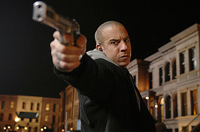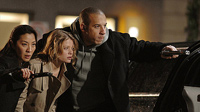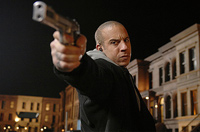Never mind the fact that it’s been universally panned. Here’s how bad Babylon A.D. really is: In the days leading up to its release, the film’s director, French auteur Mathieu Kassovitz, publicly denounced his own movie, citing disagreements with the studio and a troubled production and summing up the film as “a bad episode of 24.” But he wasn’t the only one upset about the movie; the film’s star, Vin Disel, also made public declarations about the project’s awfulness, but, very much to his credit, he did so not with a spirit of bitterness or frustration, but in a cheerfully joking, self-deprecating sort of way.

Diesel’s humorous response to the way the movie turned out offered a ray of hope that, at the very least, Babylon A. D. would be so ridiculous, so glaringly and garishly bad, it might actually be sort of fun, in a perverse and unintentional sort of way. Alas, the movie is anything but. Oppressively dark and ponderous, Babylon treads the same apocalyptic mélange as Children of Men, but with none of the sophistication or nuance that made that film provocative and memorable. This movie, by comparison, is simply a muddled, meaningless mess of images and ideas that never add up to anything more than failed attempts at philosophizing and unbearably pained stabs at storytelling.
It would be close to impossible to offer any sort of plot summary, as it’s close to impossible to discern any kind of plot; on a very broad level, the movie is about a hired gun (Diesel) who is hired to transport a young, troubled girl, Aurora (Melanie Thierry) across the near-future, sci-fi landscape of Russia and into the United States, with Aurora’s guardian (Michelle Yeoh) tagging along. But in truth, you could completely rearrange all the movie’s scenes and it would be only slightly less comprehensible, as it feels more like a long string of weird imagery and absurd scenarios than an actual story.

Rather than thinking of it as a narrative, then, it might be more helpful to think of it as a string of progressively more ridiculous moments, strung together by muddled attempts at sci-fi world-building. The movie begins with Diesel, in a voice-over narration, offering bumper-sticker philosophizing—literally, he quotes a bumper sticker, and his existential musings are so nonsensical and so overly ponderous, it’d be pretty (unintentionally) comical if there weren’t 90 minutes still to follow. From there, we get to hear Yeoh’s character lay down the ground rules of their journey together—”no foul language,” which of course provokes a string of profanity from Diesel. We see Diesel do mid-air spirals in his snowmobile, deftly dodging a, um, missile. And it all leads up to a revelation so abrupt, so random, so clearly stolen from other, better movies, it can only be described as a ham-fisted effort to inject vague religiosity into the movie that ultimately stands out as the most ludicrous moment in a film that is full of them.
Kassovitz says the studio mercilessly and carelessly edited his film down from the original version and sacrificed its sense and its logic—and on one level we can give him the benefit of the doubt, as it is very obviously the product of haphazard editing, though it’s highly dubious that an extra ten minutes of footage or a different sequencing could have made it any less of a mess than it already is. And it’s unclear exactly what this was supposed to be in the first place—it’s filled with apocalyptic imagery and postmodern cultural pastiche, as well as religious overtones and clumsy attempts at spirituality that suggest it was meant to be something fairly philosophical, but its preponderance of big guns and explosions, its annoying hip-hop soundtrack, and its fight scenes, which alternate between slow-motion close-ups and fast-motion pyrotechnics, suggest that it’s supposed to be simply the latest in a long series of action movies that try to peddle a testosterone-driven, violent and demeaning version of “masculinity” to teenage boys. Either way, it’s pathetic.

Even more saddening is that there’s some real wasted potential here; the visual effects and set designs are somewhat impressive, but, because there is never any explanation or exposition given, no sense of world-building whatsoever, it simply comes across as a totally random hodge-podge of images and cultural tropes, most notably a Coke Zero product placement that pops up several times throughout the movie. Sadder still is seeing the talented Yeoh stoop so low; unsurprisingly, Diesel wanders through the movie saying supposedly witty things in a gruff voice, which is apparently his excuse for acting.
Christians with the misfortune of seeing this movie might want to search for some sort of meaning in the religious imagery throughout the film, particularly in its second half. It would be nice to be able to comment on them here, but in truth, there’s simply no discernable design to any of it, no meaning to be found, and, as such, its utilization of religious symbols can only be called crass and vulgar—much like the film itself. A completely incompetent mess of a movie, Babylon A.D. is a joyless and totally unrewarding piece of work that, alas, doesn’t even live up to the colorful denouncements offered by its own creators.
Talk About It
Discussion starters- There are various religious symbols and images employed in this movie. Does the film say anything meaningful about religion or spirituality? What view does it seem to take of religion, if any?
- Does Toorop undergo any sort of character change by the movie’s end?
The Family Corner
For parents to considerBabylon A.D. is rated PG-13 for violence, language, and sexuality. The violence is fairly intense in places, but no more so than any other PG-13 movie of its kind; there is some blood and gore, as well as gunfights and explosions and a bit of kung fu. The language includes numerous swear words, including a few uses of the Lord’s name in vain. The sexuality is minimal, involving only one scene of brief sensuality with nothing explicit seen.
Photos © Copyright 20th Century Fox
Copyright © 2008 Christianity Today. Click for reprint information.











